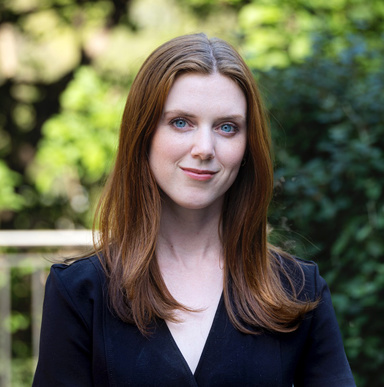
The journey of Dr. Sharice Clough (MA-SLP, 2018) from a student to a professional in her field, and soon-to-be faculty member, speaks volumes about CSD’s bragging rights that they’re a department dedicated to cultivating leaders in the field of communication sciences and disorders.
“I’m excited and confident that Sharice will bring fresh perspectives, innovative ideas, and a deep commitment to excellence in her new role,” said Eric Hunter, Department Executive Officer and Harriet B. and Harold S. Brady Chair in Liberal Arts and Sciences.
After completing her master’s degree in Speech-Language Pathology at Iowa, Clough embarked on doctoral studies in Hearing and Speech Sciences at Vanderbilt University, followed by interdisciplinary post-doctoral training in the Multimodal Language Department at the Max Planck Institute for Psycholinguistics in Nijmegen, The Netherlands.
She will join us as an assistant professor in CSD at Iowa in Fall 2026.
Clough investigates acquired neurogenic communication disorders, such as traumatic brain injury, aphasia, and dementia in adults. More specifically, she strives to know more about how people use and comprehend language in rich and dynamic contexts, like those we encounter in daily life.
Real-world communication is interactive, involving a collaborative exchange between individuals. It is also multimodal, containing a variety of communicative cues like speech, gesture, facial expressions, and eye gaze. Her goal is to better understand how these flexible and social language abilities are disrupted by brain injury.
For example, in a recent behavioral experiment, she examined how adults with and without traumatic brain injury adapted their speech, gesture, and eye gaze behavior when talking to groups of listeners with different levels of knowledge based on their prior interactions. These types of social skills underlie the ability to design our communication appropriately and efficiently for different audiences (e.g., talking to a friend versus a group of coworkers).
"Although people with traumatic brain injury can have difficulty with social communication, we tend to assess language in very controlled and isolated contexts in both the clinic and lab," she said. “It’s critical that we incorporate these dynamic and rich properties of language into our practices to create assessments that sensitively detect communication difficulties and treatments that generalize beyond the clinic room into the real world.”
Clough uses a variety of methods to study the cognitive and neural systems that underlie neurogenic communication disorders, such as behavioral testing, eye-tracking, motion tracking, neuropsychological testing, and lesion mapping. In addition to advancing our understanding of the communication abilities of people with acquired brain injury, combining these methods allows her to learn more about the links between language and the brain.
“Iowa CSD is the perfect place to grow my research program and lab. My experiences as a master’s student in the department opened many doors for me and ignited a passion for science and discovery that I’m excited to pass on to future students. Iowa has all the right ingredients and an incredible community of scholars who I’m thrilled to be joining,” she said.
Hunter says he’s eager to see the research, academic, and leadership impacts Clough will undoubtedly have on the CSD program and its students.
“Iowa CSD leans into its mission to foster a culture of growth and discovery. Our graduates –such as Sharice -- go on to achieve great things, and it’s doubly-fulfilling when those individuals return to give back to the community that supported them,” he said.